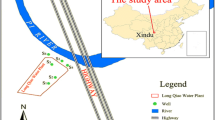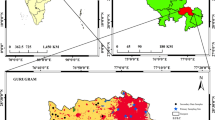Abstract
Water quality degradation affects socio-economic development inappropriately and has dire effects on human health too. Water quality indexes (WQIs) are the methods widely used for modelling water quality status. However, using these indexes is limited by some constraints like deficiency of necessary database or uncertainty of decision-making. Throughout the ongoing research, fuzzy water quality indexes (FWQIs) were developed based on the Mamdani fuzzy inference system (FIS) to overcome the above-mentioned limitations. In other words, seven FWQIs models with different water quality parameters have been developed based on triangular and trapezoidal membership functions. Later, the developed indexes were employed to evaluate the water quality of 17 wells in Saveh Plain, Iran. Compared to the conventional WQI, the results showed that the elimination of some needed parameters in development of FWQI did not decrease the accuracy of water quality classification. However, omitting some other parameters with undesirable values made the classification of water quality unreliable. According to the results, some 35 % of wells benefitted from proper drinking water quality, while approximately 30 and 35 % of them suffered from unsuitable and very poor drinking water quality, respectively.




Similar content being viewed by others
References
Araghinejad S (2014) Data-driven modeling: using MATLAB in water resources and environmental engineering. Springer, New York
Aryafar A, Yousefi S, Doulati Ardejani F (2013) The weight of interaction of mining activities: groundwater in environmental impact assessment using fuzzy analytical hierarchy process (FAHP). Environ Earth Sci 68(8):2313–2324
Azarnivand A, Hashemi-Madani FS, Banihabib ME (2014) Extended fuzzy analytic hierarchy process approach in water and environmental management (case study: Lake Urmia Basin, Iran). Environ Earth Sci. doi:10.1007/s12665-014-3391-6
Backman B, Bodiš D, Lahermo P, Rapant S, Tarvainen T (1998) Application of a groundwater contamination index in Finland and Slovakia. Environ Geol 36(1–2):55–64
Boyacioglu H (2007) Development of a water quality index based on a European classification scheme. Water SA 33:101–106
Casper M, Gemmar P, Gronz O, Johst M, Stuber M (2007) Fuzzy logic-based rainfall-runoff modelling using soil moisture measurements to represent system state. Hydrol Sci J 52(3):478–490
Chang F-J, Chang Y-T (2006) Adaptive neuro-fuzzy inference system for prediction of water level in reservoir. Adv Water Resour 29:1–10
Chang N, Chen HW, Ning SK (2001) Identification of river water quality using the fuzzy synthetic evaluation approach. J Environ Manage 63:293–305
Dahiya S, Singh B, Gaur S, Garg VK, Kushwaha HS (2007) Analysis of groundwater quality using fuzzy synthetic evaluation. J Hazard Mater 147(3):938–946
Firat M, Turan ME, Yurdusev MA (2009) Comparative analysis of fuzzy inference systems for water consumption time series prediction. J Hydrol 374:235–241
Fleming SW, Wong C, Graham G (2014) The unbearable fuzziness of being sustainable: an integrated, fuzzy logic-based aquifer health index. Hydrol Sci J 59(6):1154–1166
Gharibi H, Mahvi AH, Nabizadeh R, Arabalibeik H, Yunesian M, Sowlat MH (2012) A novel approach in water quality assessment based on fuzzy logic. J Environ Manage 112:87–95
Icaga Y (2007) Fuzzy evaluation of water quality classification. Ecol Ind 7(3):710–718
Isalou AA, Zamani V, Shahmoradi B, Alizadeh H (2013) Landfill site selection using integrated fuzzy logic and analytic network process (F-ANP). Environ Earth Sci 68:1745–1755
Kung H, Ying L, Liu L (1992) Complementary tool to water quality index: fuzzy clustering analysis. Water resour bull 28(3):525–533
Lermontov A, Yokoyama L, Lermontov M, Machado MAS (2009) River quality analysis using fuzzy water quality index: Ribeira do Iguape river watershed, Brazil. Ecol Indic 9(6):1188–1197
Lu RS, Lo SL, Hu JY (1999) Analysis of reservoir water quality using fuzzy synthetic evaluation. Stoch Environ Res Risk Assess 13:327–336
Mamdani EH (1976) Advances in the linguistic synthesis of fuzzy controllers. Int J Man Mach Stud 8(6):669–678
Milovanovic M (2007) Water quality assessment and determination of pollution sources along the Axios/Vardar River, South-eastern Europe. Desalination 213(1):159–173
Moghaddamnia A, GhafariGousheh M, Piri J, Amin S, Han D (2009) Evaporation estimation using artificial neural networks and adaptive neuro-fuzzy inference system techniques. Adv Water Resour 32:88–97
Nasiri F, Maqsood I, Huang G, Fuller N (2007) Water quality index: a fuzzy river-pollution decision support expert system. J Water Resour Plan Manag 133(2):95–105
Ocampo-Duque W, Ferre-Huguet N, Domingo JL, Schuhmacher M (2006) Assessing water quality in rivers with fuzzy inference systems: a case study. Environ Int 32(6):733–742
Ren L, Xiang X-Y, Ni J-J (2013) Forecast modeling of monthly runoff with adaptive neural fuzzy inference system and wavelet analysis. J Hydrol Eng 18(9):1133–1139
Rizwan R, Gurdeep S (2010) Assessment of ground water quality status by using water quality index method in Orissa, India. World Appl Sci J 9(12):1392–1397
Sadat-Noori SM, Ebrahimi K, Liaghat AM (2013) Groundwater quality assessment using the water quality index and GIS in Saveh-Nobaran aquifer, Iran. Environ Earth Sci 71(9):3827–3843
Saeedi M, Abessi O, Sharifi F, Meraji H (2010) Development of groundwater quality index. Environ Monit Assess 163(1–4):327–335
Said A, Stevens D, Selke G (2004) An innovative index for evaluating water quality in streams. Environ Manage 34:406–414
Sasikumar K, Mujumdar PP (1998) Fuzzy optimization model for water quality management of a river system. J water Resour Plan Manag 124(2):79–88
Sasikumar K, Mujumdar PP (2010) Application of fuzzy probability in water quality management of a river system. Int J Syst Sci 31(5):575–591
Scannapieco D, Naddeo V, Zarra T, Belgiorno V (2012) River water quality assessment: a comparison of binary-and fuzzy logic-based approaches. Ecol Eng 47:132–140
Shu C, Ouarda TBMJ (2008) Regional flood frequency analysis at ungauged sites using the adaptive neuro-fuzzy inference system. J Hydrol 349:31–43
Sugeno M (1985) Industrial applications of fuzzy control. Elsevier Science Inc, Philippines
Terzi O, Keskin ME, Taylan ED (2006) Estimating evaporation using ANFIS. J Irrig Drain Eng 132(5):503–507
Van Broekhoven E, De Baets B (2006) Fast and accurate center of gravity defuzzification of fuzzy system outputs defined on trapezoidal fuzzy partitions. Fuzzy Sets Syst 157(7):904–918
Wang K-H, Altunkaynak A (2012) a comparative case study of rainfall-runoff modeling between SWMM and FUZZY logic approach. J Hydrol Eng 17(2):283–291
WHO (2004) Guidelines for drinking water quality: training pack. WHO, Geneva
Yager RR, Filev DP (1994) Essentials of fuzzy modeling and control. Wiley, New York
Zadeh LA (1965) Fuzzy sets. Inf Control 8(3):338–353
Acknowledgments
The authors are grateful to University of Tehran along with the Regional Water Corporation of Markazi (Arak) Province, Iran, for providing data and facilities related to conducting the present research.
Author information
Authors and Affiliations
Corresponding author
Rights and permissions
About this article
Cite this article
Hosseini-Moghari, SM., Ebrahimi, K. & Azarnivand, A. Groundwater quality assessment with respect to fuzzy water quality index (FWQI): an application of expert systems in environmental monitoring. Environ Earth Sci 74, 7229–7238 (2015). https://doi.org/10.1007/s12665-015-4703-1
Received:
Accepted:
Published:
Issue Date:
DOI: https://doi.org/10.1007/s12665-015-4703-1




